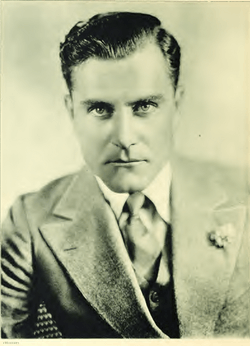Alias Jimmy Valentine (radio program)
Alias Jimmy Valentine is an old-time radio crime drama in the United States. It was broadcast on NBC-Blue January 18, 1938 - February 27, 1939.[1]
 Bert Lytell starred as Jimmy Valentine (1918 photo) | |
| Genre | Crime drama |
|---|---|
| Running time | 15 minutes |
| Country of origin | United States |
| Language(s) | English |
| Syndicates | NBC-Blue |
| Starring | Bert Lytell James Meighan |
| Announcer | Dick Joy |
| Written by | Doris Halman |
| Produced by | Frank and Anne Hummert |
| Narrated by | Ford Bond |
| Original release | January 18, 1938 – February 27, 1939 |
| Other themes | If I Should Love You |
| Sponsored by | Edgeworth Tobacco Dr. Lyons Tooth Powder |
Format
The concept for Alias Jimmy Valentine came from writer O. Henry in his short story A Retrieved Reformation.[1] That story was adapted into the 1910 play Alias Jimmy Valentine by Paul Armstrong.[2]
The program's stories focused on Lee Randall, described by Jim Cox in his book, Radio Crime Fighters: More Than 300 Programs from the Golden Age as "an ex-con and reformed safecracker [who] applied his talents and enormous underworld contacts to abet the forces of law and order."[1] While doing so, he became an honest bank clerk and fell in love with the daughter of the banker.[3]
Producers
The series was produced by Frank and Anne Hummert, who were described by Jim Cox in his book, Frank and Anne Hummert's Radio Factory: The Programs and Personalities of Broadcasting's Most Prolific Producers as "the most prolific creatives in eight decades of broadcast history."[4] They originated more than 100 radio series, about half of which were soap operas.[4]
Cox wrote that Alias Jimmy Valentine episodes raised "the never-to-be-resolved query: 'Can a protagonist go straight and overcome his impasse?'"[1] That query, Cox wrote, "was true formulaic Hummert."[1]
Personnel
Bert Lytell and James Meighan each played the lead at different times.[5] William Bennett Kilpack[6] and Earle Latimore also appeared on the program.[7]
Dick Joy was the announcer. Doris Halman was the writer.[1] Ford Bond narrated.[8]
See also
References
- Cox, Jim (2002). Radio Crime Fighters: More Than 300 Programs from the Golden Age. McFarland. p. 39. ISBN 9781476612270. Retrieved 5 October 2016.
- The American Film Institute Catalog of Motion Pictures Produced in the United States: Feature Films, 1921-1930. 1971. p. 12.
- Cox, Jim (2009). The A to Z of American Radio Soap Operas. Scarecrow Press. p. 25. ISBN 9780810863491. Retrieved 5 October 2016.
- Cox, Jim (2003). Frank and Anne Hummert's Radio Factory: The Programs and Personalities of Broadcasting's Most Prolific Producers. McFarland. p. 5. ISBN 9780786416318. Retrieved 5 October 2016.
- Terrace, Vincent (1999). Radio Programs, 1924-1984: A Catalog of More Than 1800 Shows. McFarland & Company, Inc. ISBN 978-0-7864-4513-4. P. 21.
- Cox, Jim (2004). Mr. Keen, Tracer of Lost Persons: A Complete History and Episode Log of Radio's Most Durable Detective. McFarland. p. 65. ISBN 9781476607382. Retrieved 5 October 2016.
- Herbert, Stephen (2004). A History of Early Television. Taylor & Francis. p. 466. ISBN 9780415326681. Retrieved 5 October 2016.
- Cox, Jim (1999). The Great Radio Soap Operas. McFarland. p. 26. ISBN 9781476604145. Retrieved 5 October 2016.